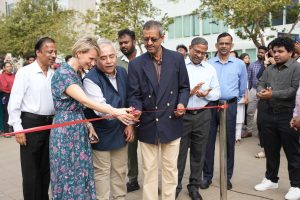Sustainable Development in the BRICS Economies
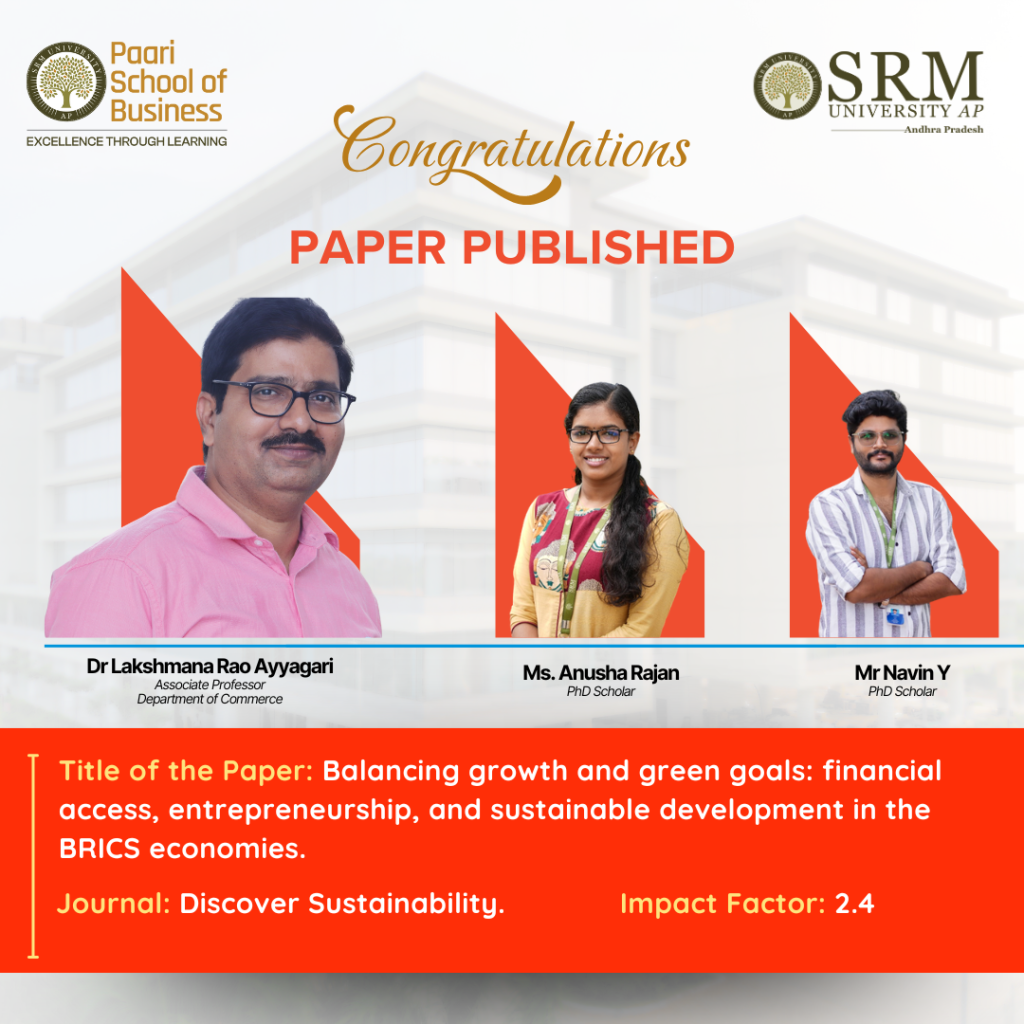 Imagine a world where economic growth of a society is done sustainably and with environmental care. Dr Lakshmana Rao Ayyagari, Assistant Professor, Department of Commerce, along with his scholars Mr Navin Y and Ms Anusha Rajan, has published an article “Balancing Growth and Green Goals: Financial Access, Entrepreneurship, and Sustainable Development in the BRICS Economies” in the Q1 journal Discover Sustainability, that looks at how countries like Brazil, Russia, India, China, and South Africa (BRICS) can support entrepreneurs without hurting the planet. The goal is to help governments, banks, and businesses grow responsibly by making sure financial tools support both money-making and environmental care.
Imagine a world where economic growth of a society is done sustainably and with environmental care. Dr Lakshmana Rao Ayyagari, Assistant Professor, Department of Commerce, along with his scholars Mr Navin Y and Ms Anusha Rajan, has published an article “Balancing Growth and Green Goals: Financial Access, Entrepreneurship, and Sustainable Development in the BRICS Economies” in the Q1 journal Discover Sustainability, that looks at how countries like Brazil, Russia, India, China, and South Africa (BRICS) can support entrepreneurs without hurting the planet. The goal is to help governments, banks, and businesses grow responsibly by making sure financial tools support both money-making and environmental care.
Abstract
Financial access is a cornerstone of entrepreneurship and a key enabler of economic development. This study examines the dual role of financial systems in promoting entrepreneurial growth and sustainable development across BRICS nations (2000–2023). Using robust PLS-SEM analysis, the research reveals that while financial access drives business formation and economic resilience, it also poses ecological challenges through resource overuse and pollution. The findings highlight a paradox: the same financial mechanisms that foster progress can strain environmental sustainability. The study proposes actionable strategies to align finance with green development goals.
Practical Implementation / Social Implications of the Research
- Policy Impact: Informs BRICS governments to introduce green credit quotas, eco-tax incentives, and sustainability assessments in funding policies.
- Financial Sector Reform: Encourages banks to incorporate environmental risks into lending practices.
- Community Empowerment: Highlights the importance of inclusive entrepreneurship programs, especially for rural and marginalized communities.
- Sustainability Education: Provides a foundation for integrating sustainability into entrepreneurship curricula and public discourse.
Future Research Plans
- Explore the role of blockchain and AI in promoting transparent, sustainable financial systems.
- Investigate gender and social equity in sustainable entrepreneurship ecosystems.
- Conduct comparative studies on green finance policy innovations beyond BRICS (e.g., ASEAN or African Union).
- Develop longitudinal, mixed-methods frameworks to assess cultural, institutional, and digital factors in sustainability transitions.
Link to the Article
- Published in Commerce Current Happenings, Departmental News, News, Research News
Dr Lakshmana Rao and Team on Financial Access and Sustainable Development
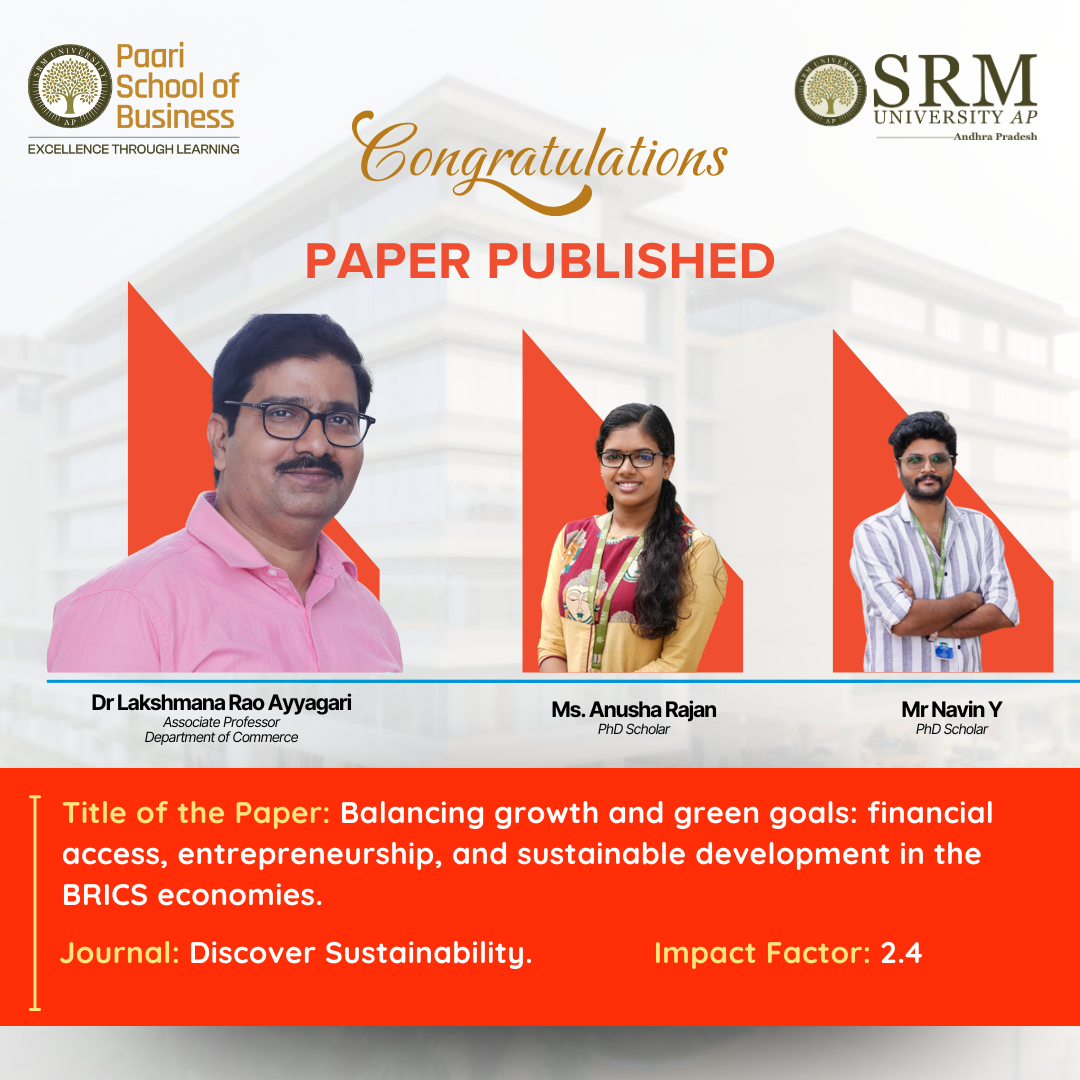 Financial access acts as both a catalyst and a challenge in today’s rapidly evolving economies. The research article “Balancing Growth and Green Goals: Financial Access, Entrepreneurship, and Sustainable Development in the BRICS Economies” by Associate Professor Dr Lakshmana Rao Ayyagari and his research scholars investigates this delicate balance between economic ambition and environmental responsibility. By applying robust PLS-SEM analysis over the period 2000-2023, the study conducted by the team at SRM AP uncovers the paradox of finance: it fuels entrepreneurship and development, while simultaneously straining sustainability goals.
Financial access acts as both a catalyst and a challenge in today’s rapidly evolving economies. The research article “Balancing Growth and Green Goals: Financial Access, Entrepreneurship, and Sustainable Development in the BRICS Economies” by Associate Professor Dr Lakshmana Rao Ayyagari and his research scholars investigates this delicate balance between economic ambition and environmental responsibility. By applying robust PLS-SEM analysis over the period 2000-2023, the study conducted by the team at SRM AP uncovers the paradox of finance: it fuels entrepreneurship and development, while simultaneously straining sustainability goals.
The findings present a timely call for reimagining financial frameworks that not only strengthen economic systems but also safeguard ecological balance. The research offers actionable insights for policymakers, financial institutions, and communities- pointing towards a future where financial access empowers entrepreneurs without compromising green development.
Abstract
Financial access is a cornerstone of entrepreneurship and a key enabler of economic development. This study examines the dual role of financial systems in promoting entrepreneurial growth and sustainable development across BRICS nations (2000–2023). Using robust PLS-SEM analysis, the research reveals that while financial access drives business formation and economic resilience, it also poses ecological challenges through resource overuse and pollution. The findings highlight a paradox: the same financial mechanisms that foster progress can strain environmental sustainability. The study proposes actionable strategies to align finance with green development goals.
Explanation in Layperson’s Terms
Imagine giving people better access to banks and loans- it helps them start businesses and grow the economy. But, if those businesses use too many natural resources or pollute the environment, growth becomes harmful. This research looks at how countries like Brazil, Russia, India, China, and South Africa (BRICS) can support entrepreneurs without hurting the planet. The goal is to help governments, banks, and businesses grow responsibly by making sure financial tools support both money-making and environmental care.
Practical Implementation of the Research
- Policy Impact: Informs BRICS governments to introduce green credit quotas, eco-tax incentives, and sustainability assessments in funding policies.
- Financial Sector Reform: Encourages banks to incorporate environmental risks into lending practices.
- Community Empowerment: Highlights the importance of inclusive entrepreneurship programs, especially for rural and marginalized communities.
- Sustainability Education: Provides a foundation for integrating sustainability into entrepreneurship curricula and public discourse.
Future Research Plans
- Explore the role of blockchain and AI in promoting transparent, sustainable financial systems.
- Investigate gender and social equity in sustainable entrepreneurship ecosystems.
- Conduct comparative studies on green finance policy innovations beyond BRICS (e.g., ASEAN or African Union).
- Develop longitudinal, mixed-methods frameworks to assess cultural, institutional, and digital factors in sustainability transitions.
- Published in Commerce Current Happenings, Departmental News, News, Research News
Paari School of Business Launch Two New B.Com. Specialisations
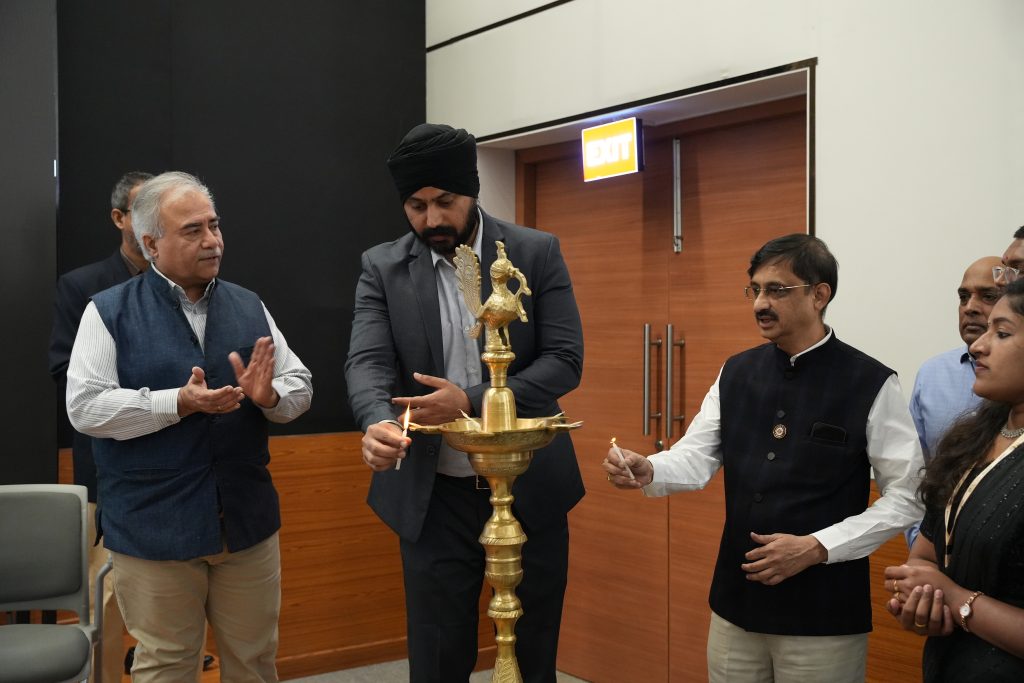
Marking a significant stride towards expanding academic offerings and equipping students with the skills required for the evolving business landscape, The Paari School of Business at SRM University-AP has launched two new specialisations for its B.Com. programme – B.Com. (CA Integrated) and B.Com. (Fintech and Banking).
The event witnessed the presence of stalwarts from Banking, Data Analytics and Chartered Accountancy along with the Vice Chancellor of SRM University-AP, Prof. Manoj K Arora, Registrar Dr R Premkumar, Dean-Paari School of Business, Prof. Bharadhwaj Sivakumaran, Head-Department of Commerce Dr A Lakshmana Rao, faculty, staff and students from the school. Mr Ruhbir Singh, CEO of Tatvic, a Global Analytics Firm, was the Chief Guest; Mr Bala Iyer, MD of Barclays Bank, was the Guest of Honour, and CA Ravi Kishore, President of ICAI Vijayawada Branch, was the Keynote Speaker.
Vice Chancellor Prof. Manoj K Arora appreciated the school for its launch of specialisations that will generously benefit the management education offered at the university. Dean Prof. Bharadhwaj briefly spoke on the objective of launching the two new specialisations and the expected outcome of the B.Com. programme. “At Paari School of Business, we offer modern, contemporary, and cutting-edge programmes that meaningfully align with current market demands. The curriculum of the two new specialisations is tightly integrated with the Fintech and CA fields and will be taught by industry experts and seasoned professionals,” stated Prof. Bharadhwaj in his welcome address.
This initiative by the Paari School of Business invokes innovation, inspiration, and excellence. In his address, Mr Ruhbir Singh, a pioneer in Digital Marketing and Data Analytics, elucidated the strategies for making it big in the business frontier. He remarked, “Critical thinking, keeping abreast with technology, and learning to present yourself are the pivotal skills graduates must equip themselves with to sprint to high-impact placements.”
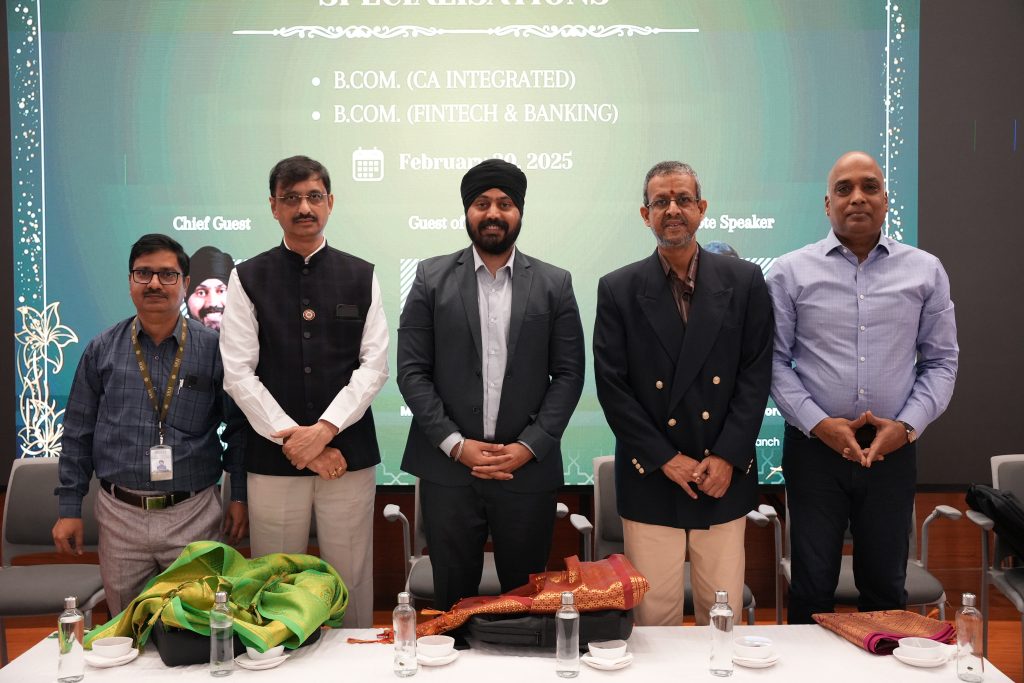
Guest of Honour Mr Bala Iyer emphasised the importance of networking and building connections among different strata of the business and economic fields as the real wealth that one must accumulate. In his keynote address, CA Ravi Kishore also underscored the significance of practical and soft skills accompanied by a mindset for continuous learning triumph over academic qualification in the real world. Both dignitaries launched the specialisations B.Com. (Fintech and Banking) and B.Com. (CA Integrated) respectively.
The event also witnessed the launch of the much-awaited two-day Business fest AMEYA’25 by the Chief Guest Mr Ruhbir Singh. AMEYA’25, the Management Mavericks’ Meet will hold numerous formal and informal events, ranging from Business Development to PR and Entrepreneurship, with a prize pool of Rs 1.75 Lakh. The fest will welcome students and participants from management colleges and universities in Vijayawada and Guntur. The event concluded with the felicitation of the esteemed dignitaries and a vote of thanks from the Head of the Commerce Department.
- Published in Commerce Current Happenings, Departmental News, News, Paari Current Happenings, paari-events
Research Paper on ESG Scores and Their Effect on Polluting Companies After COVID-19
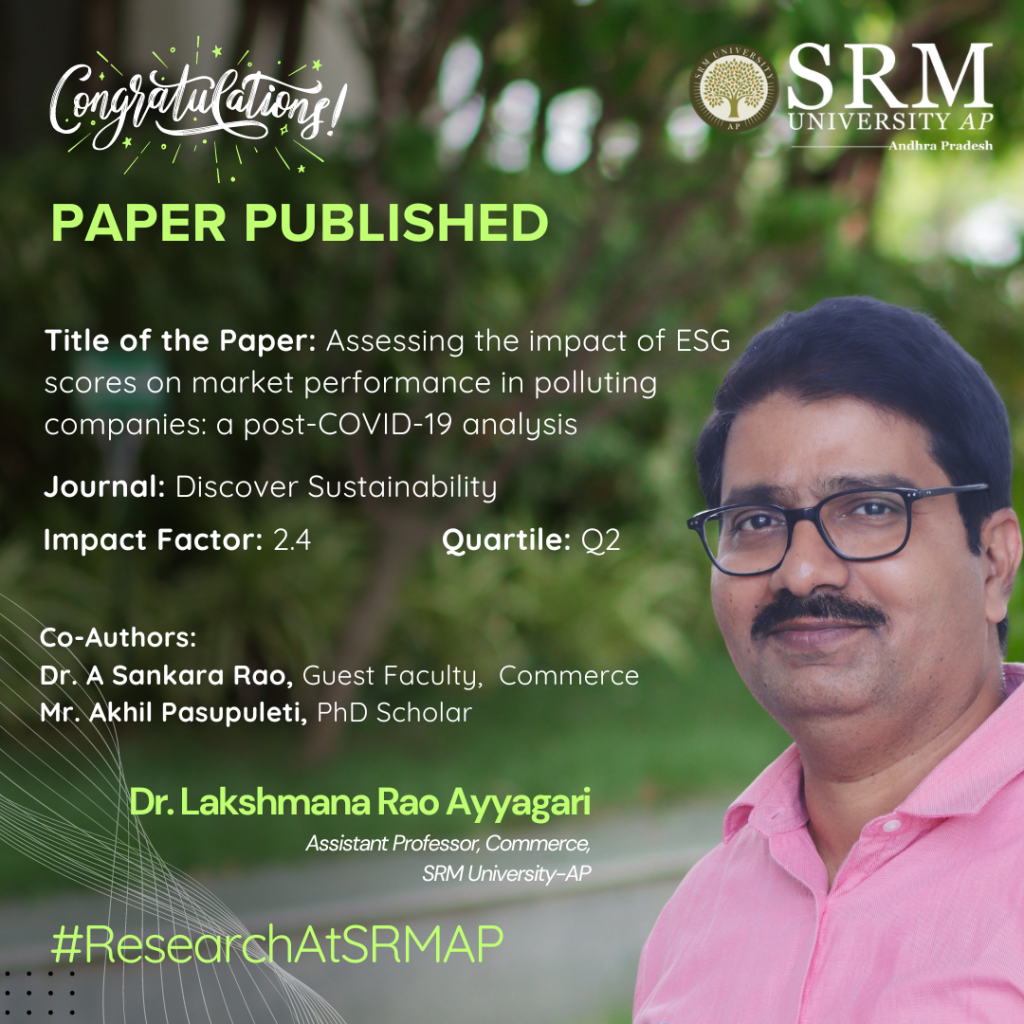
The Department of Commerce, under the Paari School of Business, is proud to present the research publication of Dr Lakshamana Rao Ayyangari, Guest Faculty Dr Sankar Rao, and Research Scholar Mr Akhil Pasupuleti. Their research paper, titled “Assessing the impact of ESG scores on market performance in polluting companies: a post-COVID-19 analysis,” is featured in the Q2 journal “Discover Sustainability.” Here is an interesting abstract of their research.
Abstract:
The study aims to unravel the impact of Environmental Social Governance (ESG) scores on the firm’s market performance of polluting companies. Moreover, the study also finds out the moderating effect of green initiatives. The study’s population consisted of 67 companies that were chosen from the list of polluting companies given by the Central Pollution Control Board of India for the post-COVID-19 timeframe of 2020–2023. The results indicate that the performance of ESG will improve the financial performance of the company.
Practical Implementation:
The analysis showed that companies with higher ESG scores generally perform better in the market. This means that firms that are more responsible in terms of environmental, social, and governance practices tend to do well financially. However, the study found that green initiatives did not have a significant impact on this relationship.
These findings are important for company managers and stakeholders. Understanding the connection between ESG practices and market performance can help managers create strategies to improve their ESG scores, ultimately boosting their financial performance.
Future Research Plans:
i) Focus on the R&D investment and sustainability.
ii) Studying the relationship between green finance and sustainability
iii) Exploring the relationship of CSR in sustainability
- Published in Commerce Current Happenings, Departmental News, News, Research News
Decoding Investment Perceptions in India: Dr Lakshmana Rao’s Recent Publication
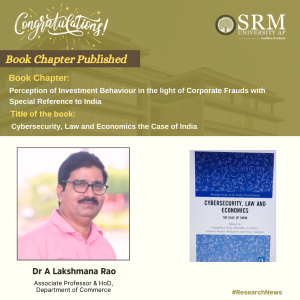 In a significant contribution to the academic discourse on corporate frauds and investment behaviour, Dr A Lakshmana Rao, Head of the Department and Associate Professor in the Department of Commerce, has published an insightful book chapter titled “Perception of Investment Behaviour in the Light of Corporate Frauds with Special Reference to India,” the chapter is a part of the book “Cybersecurity, Law and Economics: The Case of India,” published by Routledge, a prestigious Taylor and Francis Group.
In a significant contribution to the academic discourse on corporate frauds and investment behaviour, Dr A Lakshmana Rao, Head of the Department and Associate Professor in the Department of Commerce, has published an insightful book chapter titled “Perception of Investment Behaviour in the Light of Corporate Frauds with Special Reference to India,” the chapter is a part of the book “Cybersecurity, Law and Economics: The Case of India,” published by Routledge, a prestigious Taylor and Francis Group.
Dr Rao’s work delves into the intricate dynamics of investor psychology and market trust, particularly in the aftermath of corporate scandals. His research provides a nuanced understanding of how investors navigate the complex landscape of financial decision-making when confronted with corporate malfeasance.
The chapter is poised to serve as a valuable resource for students, academics, and professionals interested in the intersections of finance, law, and cybersecurity. It also underscores the importance of robust legal frameworks and transparent corporate governance in maintaining investor confidence in the Indian market. With this publication, Dr Rao has made a notable contribution to the literature on economic security and investment strategies, offering a timely examination of the challenges and considerations unique to the Indian context.
A Brief Introduction of the Book Chapter
This book examines the intersection between cybersecurity and India’s law and economy and offers a course of action for designing efficacious policies against emerging cybercrimes in the country.
It reviews the boom in infrastructure growth in India and the security challenges this presents to the domestic economy and legal system. Contributors conduct a risk assessment of the potential economic impacts and security vulnerabilities, as well as identify the current regulatory and legal gaps regarding cryptocurrency, e-commerce and digital banking. The book also considers the subject of data localisation and sovereignty, and the challenges of establishing an indigenous data architecture. By discussing the economic impact of cybersecurity and incorporating recommendations from scholars, activists, academics, young legal intellectuals, and professionals in the field, the chapters propose new measures and protections for lawmakers and policymakers to adopt.
Significance of the Book Chapter
The book chapter titled “Perception of Investment Behaviour in the Light of Corporate Frauds with Special Reference to India” is a survey-based study that examines the general investor’s intentions regarding their investment behaviour in various investment options and their behavioural changes in the case of corporate frauds.
Co-authors of the Book Chapter
Two co-authors, Dr G Ramakrishnan and Dr Nikhil Kulshrestha, helped conduct the research and survey.
Link to the Book Chapter publication
Publication Details (incl. Publisher, ISBN, Launch date, Edition, etc)
ISBN 9781032852454
232 Pages 8 B/W Illustrations
October 1, 2024, by Routledge
Price: £ 135
- Published in Commerce Current Happenings, Departmental News, News, Research News
Unveiling the Post-Pandemic Tapestry of Mind and Body in Türkiye
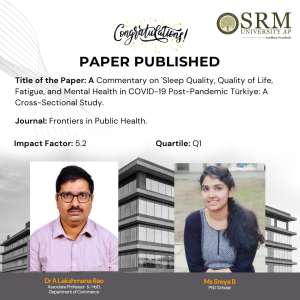 We are thrilled to announce that Dr A Lakshmana Rao, Associate Professor from the Department of Commerce along with Ms Sreya B, a distinguished PhD Scholar, have made a significant contribution to the field of public health with their latest publication.
We are thrilled to announce that Dr A Lakshmana Rao, Associate Professor from the Department of Commerce along with Ms Sreya B, a distinguished PhD Scholar, have made a significant contribution to the field of public health with their latest publication.
Their paper, titled “A Commentary on ‘Sleep Quality, Quality of Life, Fatigue, and Mental Health in COVID-19 post-pandemic Türkiye: A Cross-Sectional Study’,” has been published in the esteemed journal Frontiers in Public Health, which boasts an impressive impact factor of 5.2.
This groundbreaking study delves into the crucial aspects of sleep quality, quality of life, fatigue, and mental health in the aftermath of the COVID-19 pandemic in Türkiye. The research provides insightful commentary and analysis, contributing valuable knowledge to our understanding of the pandemic’s long-term effects on human well-being.
The SRM University-AP community is proud of Dr Rao and Ms Sreya B for their dedication and excellence in research. Their work not only enhances the reputation of our institution but also serves as an inspiration for our students and faculty alike.
We congratulate them on their achievement and encourage our readers to access the full paper to learn more about the study’s findings and implications for public health.
Abstract
This commentary examines the impact of the COVID-19 pandemic on mental health and sleep quality among the Turkish population, focusing on socio-demographic disparities and gender-based differences. To investigate the lasting effects of the pandemic, a comprehensive cross-sectional, multi-center-based survey was conducted in 2022. The study used robust sampling strategies and validated assessment tools such as WHOQOL-BREF, PHQ-15, DASS-21, GAD-7, PSQI, and FAS to reveal significant associations between poor sleep quality and worsened mental health.
The findings highlight the need for targeted interventions post-pandemic. The study conducted a detailed analysis, including multivariate regression, to explore the interaction between socio-demographic factors, mental health, and sleep quality, providing valuable insights for future public health interventions that consider both socio-demographic characteristics and lifestyle factors. In conclusion, the study advocates prioritising interventions that enhance sleep quality as a crucial aspect of post-pandemic public health, offering potential avenues for mitigating mental health disorders. Despite acknowledged limitations, the research’s contributions to understanding post-pandemic mental health challenges underscore its relevance in shaping targeted public health interventions.
Explanation of the Research in Layperson’s Terms
This article discusses a research study conducted in Turkey to investigate the impact of the COVID-19 pandemic on people’s sleep, quality of life, fatigue, and mental health. The study discovered that numerous individuals experienced sleep problems and mental health disorders following the pandemic, likely due to stress and social isolation. It suggests that enhancing sleep quality could help to improve mental health in the future, emphasising the significance of addressing these issues in public health strategies.
Title of Research Paper in the Citation Format
Sreya B, Lakshmana Rao A, (2024) Commentary: Sleep quality, quality of life, fatigue, and mental health in COVID-19 post-pandemic Türkiye: a cross-sectional study. Front. Public Health 12:1393054. Doi: 10.3389/fpubh.2024.1393054
Practical Implementation or the Social Implications Associated with the Research
The findings of the research have significant practical and social implications for addressing the impact of the COVID-19 pandemic on the Turkish population. The study underscores the importance of targeted interventions aimed at improving sleep quality to mitigate long-term mental health challenges. These interventions might involve stress management programs, education on sleep hygiene, and increased access to mental health services. Furthermore, optimising healthcare resource allocation by prioritising mental health services and sleep disorder clinics could enhance support for individuals struggling with mental health issues.
Public health campaigns focusing on the importance of sleep for mental well-being could raise awareness and promote strategies for improving sleep quality across various demographic groups. Additionally, the research helps reduce stigma around mental health by highlighting the prevalence of mental health symptoms and sleep disturbances post-pandemic, encouraging more individuals to seek support without fear of judgment. Moreover, recognising the impact of social isolation on mental health and sleep quality underscores the importance of fostering social support networks and community connections to aid in post-pandemic recovery.
Policy development informed by the research findings could address broader social determinants of health, such as housing insecurity and access to healthcare, to create a more supportive environment for mental health and sleep quality improvement initiatives. Overall, integrating mental health and sleep quality considerations into post-pandemic recovery efforts is crucial for promoting the overall well-being of the Turkish population.
- Published in Commerce Current Happenings, Departmental News, News, Research News
A Study on Sustainable Organisational Development in the IoT Era
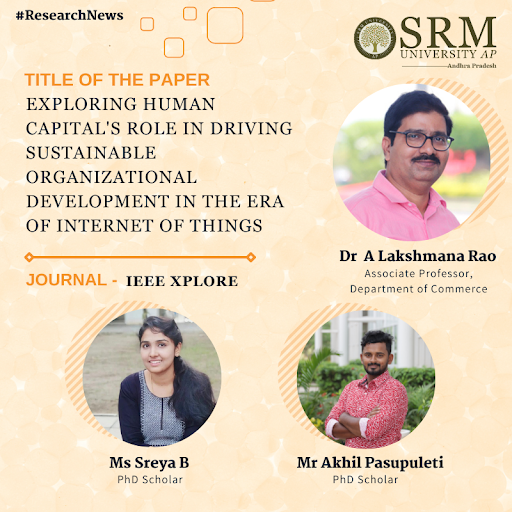 Human capital plays a crucial role in shaping an organisation’s growth in today’s digital age. It’s the idea generated by the human capital that leads to innovation. Dr A Lakshmana Rao, Associate Professor, Department of Commerce, along with his research scholars Ms Sreya B and Mr Akhil Pasupuleti, conducted a comprehensive study on human resource management in the information technology sector of Kerala. Their research paper titled “Exploring Human Capital’s Role in Driving Sustainable Organisational Development in the Era of Internet of Things” focuses on 320 participants from Kochi Infopark and investigates the impact of the Internet of Things (IoT) on their lives.
Human capital plays a crucial role in shaping an organisation’s growth in today’s digital age. It’s the idea generated by the human capital that leads to innovation. Dr A Lakshmana Rao, Associate Professor, Department of Commerce, along with his research scholars Ms Sreya B and Mr Akhil Pasupuleti, conducted a comprehensive study on human resource management in the information technology sector of Kerala. Their research paper titled “Exploring Human Capital’s Role in Driving Sustainable Organisational Development in the Era of Internet of Things” focuses on 320 participants from Kochi Infopark and investigates the impact of the Internet of Things (IoT) on their lives.
Abstract
The Internet of Things (IoT), a network of interconnected devices and sensors linked through the Internet, facilitates the connection between individuals, their devices, and vast amounts of data. Within companies, the human resources department plays a crucial role in managing the pressure generated by various aspects, including marketing, development, and the application of IoT in human resources. This study is motivated by the need to understand the potential of IoT in strategic human resource management practices. To explore the fundamental strategic human resource management practices and assess their mediating effects, this research gathered data from 320 respondents in the Kerala information technology sector, specifically Kochi Infopark, consisting of both lower-level executives and senior managers. The study utilises statistical analysis to examine the relationship between sustainable human resource practices, the Internet of Things, and sustainable human resource growth. Furthermore, the study highlights the IoT’s role as a mediator between strategic human resource management practices and factors contributing to sustainable HR growth, demonstrating a positive impact of independent variables on dependent variables. These findings emphasise the potential for organisations to enhance HR practices, decision-making, and innovation using IoT during crises and uncertainties. Integrating IoT with SHRM empowers organisations to effectively manage challenges and complex environments.
Practical Implementation
a) Employee Monitoring Systems: Implement IoT-enabled employee monitoring systems using sensors and wearable devices. This allows organisations to collect data on employee activities, health, and work environments. Analysing this data helps identify patterns, optimise resource allocation, and enhance overall employee well-being.
b) Talent Management Solutions: Utilise IoT devices to gather data on employee skills, competencies, and training needs. This information is valuable for developing personalised training programs, creating career paths, and strategising succession plans. Integrating IoT into talent management aligns HR practices with evolving workforce needs, leading to improved satisfaction and retention.
c) Remote Work Solutions: In times of crisis, such as the COVID-19 pandemic, leverage IoT-enabled remote work solutions. These solutions facilitate seamless communication, collaboration, and virtual team management. Integrating IoT with HR practices enables organisations to effectively manage remote workforces, maintain employee engagement, and adapt to challenging circumstances.
Social Implications
a) Improved HR Practices: Integrating IoT with HR practices enhances decision-making and fosters innovation. This, in turn, contributes to improved HR practices, ensuring that organisations are equipped to address contemporary challenges and complexities.
b) Employee Well-being: The use of IoT in employee monitoring systems promotes a holistic approach to employee well-being. Organisations can proactively address health and safety concerns, leading to a healthier and more engaged workforce.
c) Skill Development and Career Growth: IoT-driven talent management solutions contribute to individual skill development and career growth. Employees benefit from personalised training programs, creating a positive impact on professional development.
d) Crisis Adaptability: The integration of IoT in remote work solutions demonstrates organisational adaptability during crises. This not only ensures business continuity but also highlights a commitment to employee welfare in challenging situations.
e) Technological Advancement: Embracing IoT showcases an organisation’s commitment to technological advancement. This can enhance the organisation’s image, attracting top talent and positioning it as an industry leader.
Future Research Plans
In their upcoming research endeavours, the trio will focus on unlocking the bottlenecks of IoT-driven remote work dynamics and its influence on collaboration, productivity, and employee well-being in the post-pandemic context. They also plan on exploring the impact of interconnected devices on the moonlighting behaviours of employees and employment trends in IT firms and among professionals.
We wish the trio all success in their future endeavours.
- Published in Commerce Current Happenings, Departmental News, News, Research News
Why choose BCom (Hons) at SRM University-AP?
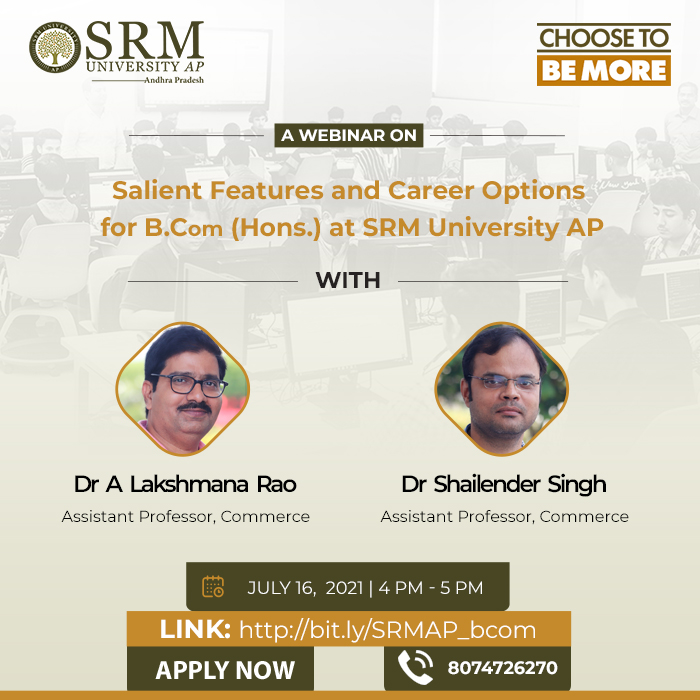 In the wake of Admissions-2021, the Department of Commerce is holding a formal webinar on “Salient features and career options for BCom (Hons) at SRM University-AP”, highlighting the contemporary aspects of the subject and the career paths that one can choose after pursuing Commerce in our university. Dr A Lakshmana Rao and Dr Shailendra Singh from the Department of Commerce, SRM University-AP, will elucidate on the topic on July 16, 2021, 4.00 pm onwards.
In the wake of Admissions-2021, the Department of Commerce is holding a formal webinar on “Salient features and career options for BCom (Hons) at SRM University-AP”, highlighting the contemporary aspects of the subject and the career paths that one can choose after pursuing Commerce in our university. Dr A Lakshmana Rao and Dr Shailendra Singh from the Department of Commerce, SRM University-AP, will elucidate on the topic on July 16, 2021, 4.00 pm onwards.
The vision of the Department of Commerce under the School of Entrepreneurship and Management Studies (SEAMS) is to prepare agents of change in business, life, and society. The department, which has highly experienced faculty with international exposure, aims to build business leaders who represent the university in global standards. The curriculum not only caters to the theoretical aspect of the subject but also implements the practical methods for the understanding of real-life problems. The academic programmes and workshops held at regular intervals provide students with in-depth knowledge of the subject. The department exposes its students to well-known business and industry experts. It urges students to formulate innovative business ideas and represent them on global platforms.
All commerce aspirants are cordially invited to join this introductory session on July 16, 2021, at 4:00 pm to get worthwhile insights on pursuing a BCom (Hons) degree at SRM University-AP.
Register here: https://srmap.zoom.us/webinar/register/WN_-lhIzqejTnGHr2KbQEwmVg
- Published in Admission Events - Domestic, Commerce Current Happenings
Varying impact of health expenditure in Southeast Asia
Health expenditure assumed enormous importance with the outset of coronavirus pandemic. The disparity between public and private health expenditure will often reflect in the health outcome of any nation. Through the research paper titled ‘The dynamics of public and private health expenditure on health outcome in Southeast Asia’ published in the journal Health and Social Care in the Community, Dr Shailender Singh, Associate Professor, Department of Commerce, attempts to argue that public expenditure on health has a substantial impact over private spending across the countries of ASEA.
Abstract of the Research
This study examines the dynamics of public and private health expenditure on health outcomes in Southeast Asia, vis-a-vis two of the Sustainable Development Goals (SDGs). The techniques of fixed effect, random effect, and feasible generalized least square methods are employed to obtain robust estimates. Further, the analysis dives deep into the country-specific impact of public and private health expenditure on health outcomes using the technique of seemingly unrelated regression. Estimates show that, across Southeast Asia, public health expenditure alone contributes to improving life expectancy at birth, lower levels of under-five, and non-communicable disease mortality rates. Unlike public health expenditure, private health expenditure contributes to better health outcomes only in Brunei and Singapore but not across the countries of Southeast Asia.
The paper asserts that, despite the statistical significance of private health spending with respect to the health outcomes, it does not contribute to lower mortality rate (MR) and higher life expectancy at birth. The results strongly support several prior pieces of evidence in the literature regarding health expenditure and health outcomes. The country-specific estimates show that public health spending contributes greatly to lower mortality rate, particularly in Brunei and Singapore. By contrast, private health spending does not contribute to lower levels of U5MR and NCD mortality rate across the countries of ASEA except in Cambodia, Indonesia, and Philippines.
The differences in economic development and the settings of health systems in these countries could be a plausible reason for the inability of private health expenditure to contribute to lower levels of NCD mortality rate in most of these countries. The result implies that more funding to the public health system has the potential to lower U5MR and NCD MR close to the SDGs target across the countries of ASEA. Also, strengthening the health system through providing greater access to preventive services for diabetes, hypertension, respiratory diseases, and cancers at primary care units may help in better diagnosis and management of these chronic conditions in Indonesia, Laos, and Myanmar where NCD MR is relatively high. However, an increase in funding alone may not be sufficient at improving health outcomes. For emerging conditions, diet modification, active physical exercise, little tobacco and alcohol consumption are also imperative.
The research is reported to be the first of its kind that examines the dynamics of public and private health expenditure on health outcomes in line with the SDGs targets. Apart from the traditional indicators commonly used as health outcomes in the literature (life expectancy and U5MR), the study further extends the literature by introducing NCD MR as an additional health outcome which could play a pivotal role in providing empirical evidence to the health policymakers and researchers.
Health plays an important role in promoting human capital and the economic growth of a country. The available stock of human capital in a country determines the rate of growth in its per capita income. A healthy individual contributes more to their economy by allocating more hours to work, earning more disposable income, in turn investing more in human development.
As the individual stock of health tends to diminish over time, there is a need to augment it by making more investment in time, income, and regular medical care. Thus, this research work has a societal benefit for the population of Southeast Asia to identify the threats in the field of health and focus more on their well-being for improving the state of health. Dr Singh conducted this research in collaboration with Dr Nishant Kumar, Amity University, Noida.
In future, he also intends to analyse the impact of socioeconomic and behavioural health determinants on the health system efficiency of the Middle East region, and to predict the key drivers for health care expenditure growth in the Middle East region through Grossman-PLS Modeling Approach.
- Published in Commerce Current Happenings, Departmental News, News, Research News
Going green is the new fashion
The Department of Commerce is glad to announce that Dr Shailender Singh, Associate Professor, published a paper titled ‘Pro-Environmental Purchase Intention Towards Eco-friendly Apparel: Extension of the theory of planned behavior model’ in the Journal of Global Fashion Marketing published by Taylor and Francis. The research is conducted in collaboration with Dr Nishant Kumar, Amity University, Noida.
Abstract of the Research
In this study, the theory of planned behaviour (TPB) model is employed with environmental concern, personal moral norms, and perceived consumer effectiveness to better predict the eco-friendly apparel purchase intention of educated Indian youths. Variance-based partial least square-structural equation modelling (PLS-SEM) is applied to evaluate the hypothesized model. Findings indicated that perceived behavioural control has a strong significant positive influence on purchase intention, followed by personal moral norms, attitude, and perceived consumer effectiveness. Environmental concern is found to indirectly affect purchase intention through three primary TPB variables and personal moral norms. Multi-group analysis (MGA) examines the moderating effect of perceived consumer effectiveness on an attitude–intention relationship. The highly perceived consumer effectiveness group is shown to have a more consistent attitude-purchase intention relationship as compared to the low-perceived consumer effectiveness group. The study promulgates insights to professionals and policymakers to formulate sustainable marketing strategies and policies to cope with the indigenous market conditions.
The textile industry has emerged as a significant pollution source owing to a rise in carbon footprint, the spike in greenhouse gas emissions, and increasing landfill waste. Sustainable fashion has become a new style statement, and industries are shifting their orientation towards environment-friendly manufacturing. A plethora of research studies have been conducted to explore consumer behaviour intention towards visiting green hotels, green products, organic food, and electric vehicles. Studies have also been done to understand consumer behavioural intention toward sustainability in apparel, sustainability, social media communication, ethical fashion consumption behaviour, and eco-friendly apparel in developed countries. However, the paucity of research studies examining the influential factors affecting purchase intention of eco-friendly apparel in a developing economy makes this study more imperative.
This study furnishes the problem by examining the eco-friendly apparel purchase intention of the educated Indian youth in the sustainable apparel framework by investigating the potential of three core predictors of purchase intention in the theory of the planned behaviour model. Furthermore, the study extends the model by adding three more variables: environmental concern (EC), personal moral norm (PMN), and perceived consumer effectiveness (PCE). Moreover, this study also examines the PCE as a moderator between consumer attitude and eco-friendly apparel purchase intention (PI), which adds to the existing body of knowledge. The study promulgates insights to professionals and policymakers to formulate sustainable marketing strategies and policies to cope with the indigenous market conditions.
Based on the proposed extended framework, the study disseminates several practical implications to attain sustainability in fashion:
(i) The strong PBC influence on apparel purchase intention would facilitate marketing professionals to support consumers with sustainable apparel choices through clear visibility, long-term benefits, and striking design with a vast form of offerings, sustainability certification, and ease of access.
(ii) It has also been observed that youth’s moral obligation to behave ethically no longer depends on social pressure. Consumers may feel that the discussion on pro-environmental intention is not having social acceptance. Policymakers must bring opinion leaders to pitch the benefit of using organic clothing so that it can be discussed socially and develop suitable sustainable purchase intent.
(iii) Marketers should use vivid marketing communication tools to educate customers about the attribute-based benefits of organic apparel and the technological difference which makes it different from fast fashion.
(iv) Policymakers should sensitize people about the deteriorating environment and try to teach pro-environmental intent through green info-commercials, organic apparel labels, socio-environmental themes in products, and affordable pricing strategies.
(v) Marketers may adopt various media platforms to showcase how individual-specific green behaviour is self-sufficient in combating environmental problems. This would increase the PCE level among people, further leading to an attitudinal shift.
The Indian government can launch an awareness campaign based on the theme of environment protection through individual contributions and urge citizens to accept green as a socially accepted norm.
- Published in Commerce Current Happenings, Departmental News, News, Research News
- 1
- 2


